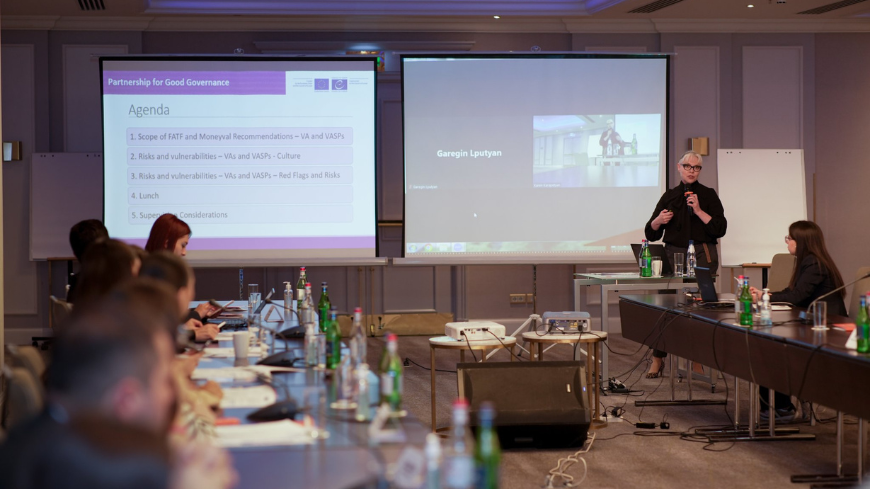Representatives of the Central Bank of Armenia, including the Financial Monitoring Centre within the Central Bank, participated in a workshop on risk-based Anti-Money Laundering/Countering the Financing of Terrorism (AML/CFT) regulation and supervision in the area of virtual assets, organised in Yerevan on 24-25 October 2022.
The Armenian authorities are continuously taking steps to align the system of combating money laundering and terrorist financing (ML/TF) to international standards and evolving ML/TF risks at global and national level. In this context, the Law on Combating Money Laundering and Terrorist Financing of 2008 (AML Law) has been progressively amended, and related measures have been put in place for its application, so as to fulfil the international obligations of the country, including the Recommendations of the Financial Action Task Force (FATF) and recommendations resulting from the Mutual Evaluations of the Council of Europe’s Committee of Experts on the Evaluation of Anti-money Laundering Measures and the Financing of Terrorism (MONEYVAL).
Recent legislative amendments initiated by the Financial Monitoring Centre within the Central Bank (the Armenian Financial Intelligence Unit – FIU) relate to the introduction of regulatory and risk-based supervisory measures necessary for the effective prevention and detection of ML/TF in the area of virtual assets (VAs) and virtual asset service providers (VASPs). The draft legislative package includes amendments to the current AML Law as well as a new draft Law on Digital Assets. Upon request from the FIU, the Council of Europe provided an expert review of the mentioned draft legal acts, with recommendations for their further improvement.
As a follow-up to this initiative, the workshop aimed to support the representatives of the supervisory authorities of the financial sector of Armenia to discuss and enhance risk-based AML/CFT regulation and supervision of virtual asset service providers, and the area of virtual assets more broadly. The Council of Europe expertise provided at the workshop covered the latest FATF guidance on the application of a risk-based approach towards VAs, elements of the 5th EU Anti Money Laundering Directive and other international and European standards, but also practical advice relevant to the supervisors – including risks and vulnerabilities associated with VAs, red flags, and other considerations for effective supervision. In addition, interactive discussions and practical exercises on real cases allowed participants to confront some of the complex real-life challenges to be expected when undertaking the regulation and supervision of VASPs in their country.
Following the workshop, the FIU team in charge of developing the draft legislation on digital assets also benefited from additional feedback and recommendations on the latest version of the draft legal provisions.
The Deputy Governor of the Central Bank of Armenia highlighted the high level of priority given to the ongoing development of the national legislative framework on VAs and VASPs and emphasised the importance of the cooperation with the Council of Europe in this area, to ensure alignment with the recommendations of the FATF and MONEYVAL, and to learn lessons from other countries’ practices. The support provided through this initiative contributes to the Armenian government’s efforts to build up-to-date mechanisms to better prevent and detect money laundering, terrorist financing and other economic crime.
These activities were organised in the framework of the Project on “Strengthening institutional capacities to fight and prevent corruption in Armenia” which is co-funded by the European Union and the Council of Europe and implemented by the Council of Europe in their Partnership for Good Governance II 2019-2022.





